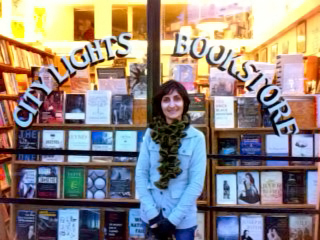
Mary Akers: I really love your essay “Beadwork.” Lately I’ve been thinking a lot about how art and recovery are often inextricably linked. A song can help us heal, a piece of writing, even a beautiful painting can speak to whatever is weighing heavy on our minds. And your mother’s beading of rosaries strikes me as a creative act, too–the hand-making of something beautiful and meaningful designed to share with others. Would you care to comment on that?
Anjali Enjeti: Perhaps there’s a sort of yin yang thing going on when it comes to recovery. I think after tragedy, the soul needs creation to balance out the destruction. Or maybe the mind just needs distraction to comprehend grief. Regardless, I think there’s something particularly therapeutic about creating something physical, something tangible, to hand to someone who is hurting. The creative energy my loved ones poured into beading a rosary, baking cookies, handwriting a note, knitting a pair of socks— sustained me through my darkest times. Creation, just like recovery, is a necessary process of life.
MA: I agree–creation to balance out the destruction. That’s a nice way to look at it. Light to balance tha dark. Do you feel that writing about painful experiences actually helps us to recover from them? And do you have any thoughts on how or why that process works?
AE: Absolutely.
There are very few socially acceptable ways to react to pain. I couldn’t scream in the middle of a park, have in a massive meltdown in the aisle of a grocery store. I couldn’t crawl into a deep dark hole and stay there until I felt better. I couldn’t quit life or stop time.
The only thing I could do was write.
Writing was a means for me to relive my pain over and over and over again until I could somehow grasp its depth and complexity. Once I compartmentalized my emotions into metaphors, italics, paragraphs or ellipses– once I committed my silent voice to a narrative form– I began to heal.
MA: Yes. A friend of mine survived banishment to Siberia during Stalin’s brutal regime and he swears that retelling the story for 70 years now has taken out all the sting of it in a very healthy way. (And he’s a psychologist, so he ought to know!) One image from your essay that really sticks with me is found in the line: “I try to picture American soldiers combing the desert with dog tags hanging around their necks, M16s secured to their chests, and black rosaries stuffed in their pockets.” As soon as I read that, I try to picture it, too, and I think it’s important that we do. It also links you and your struggles, and your mother and her rosary group to men halfway around the world, fighting for their lives and also fighting to recover from their own traumas. Did you feel that connection, too?
AE: Recovery is a battle, isn’t? A war zone with no boundaries. When we hurt, we are bruised and battered soldiers, trying to find meaning in senseless violence. We are stunned by the assault on our senses. The harder the fight, the more aggressive we have to be to find a way out.
When I held the rosaries for the soldiers my mother made, I felt stronger, more ready, to face the remainder of what I hoped would be a successful pregnancy. But the black rosaries were also a sobering reminder for me that what others faced in the world was far worse than my own individual pain. This perspective was crucial to my recovery.

MA: You also talk about faith in terms of Catholicism, and Hinduism, and an unusual melding of the two. I’m not convinced that the word “faith” has to be a stand-in for organized religion, despite what so many politicians would have us believe. I think faith can exist on its own. Do you believe that the act of recovering requires faith in some form?
AE: Ultimately, the type of faith that got me through a very stressful pregnancy did not originate from organized religion or a particular philosophy. It was my mother’s faith in me.
I will say this—the older I get, the less I understand faith. But if faith is the belief that the tide will eventually turn, that the storm will blow over, that the fire will burn out, then yes, I think recovery requires faith. What kept me going on my very worst days was faith in the words of friends with similar losses: You won’t always hurt this badly.
MA: And finally, what does “recovery” mean to you?
AE: Recovery to me is self-forgiveness. It’s the freeing of oneself from any blame that may or may not have contributed to the trauma. It’s the shelving of infinite “what-ifs,” the relinquishment of 20/20 hindsight.
I knew I started on my road to recovery when, instead of going in circles, I took a step in a new direction, toward a new normal. Though I knew I would never, ever be the same person again, I also knew that it was OK that I’d never be the same person again.
MA: Yes, a new direction. I like that. Thank you for participating, Anjali. I’ve really enjoyed it. And for our readers, here is more to enjoy–a few links to additional essays:

Pingback: “Beadwork” by Anjali Enjeti | Rkvry Quarterly Literary Journal